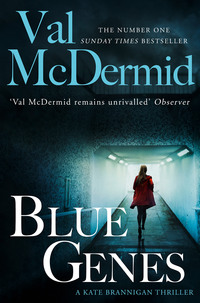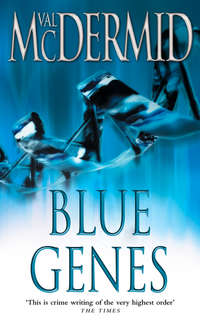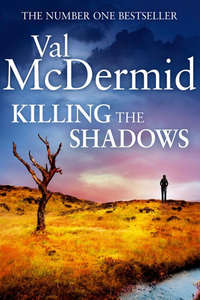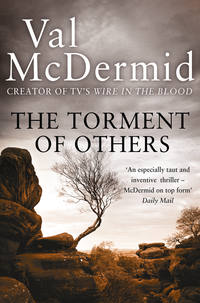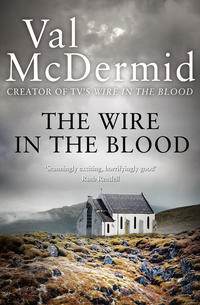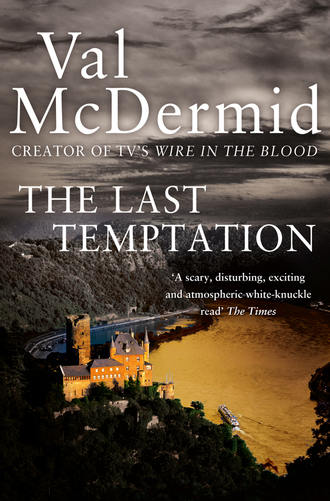
Полная версия
The Last Temptation
She hoped she hadn’t let the depth of her disappointment show as they’d left the pub, forcing her face to smile the congratulation of a friend. Then she’d turned away, letting the sharp north-easterly wind give her an excuse for smarting eyes. She’d followed his car up the hill away from the picture-postcard harbour to the small hotel where he’d arranged a room for her. She’d taken a defiant ten minutes to repair her make-up and arrange her hair to its best advantage. And to change out of her jeans into a tight skirt that revealed more than anyone in the Met had ever seen. She might have lost the battle, but that didn’t mean she had to beat a bedraggled retreat. Let him see what he’s missing, she thought, throwing down a gauntlet to herself as much as to him.
Driving back to his cottage, they’d said little of consequence, making small talk about life in a small town. The cottage itself was much as Carol had expected. Whatever this woman meant to Tony, she hadn’t stamped her identity over his space. She recognized most of the furniture, the pictures on the wall, the books lined up on shelves along the study wall. Even the answering machine, she thought with a faint shudder, ambushed by memory.
‘Looks like you’ve settled in,’ was all she said.
He shrugged. ‘I’m not much of a homemaker. I went through it with a bucket of white paint then moved all the old stuff in. Luckily most of it fitted.’
Once they were settled in the study with mugs of coffee, present constraints somehow slipped away and the old ease that had existed between them reasserted itself. So while Tony read the brief that Morgan had couriered to Carol that morning, she curled up in a battered armchair and browsed an eclectic pile of magazines ranging from New Scientist to Marie Claire. He’d always read a strange assortment of publications, she remembered fondly. She’d never been stuck for something to read in his house.
As he read, Tony made occasional notes on a pad propped on the arm of his chair. His eyebrows furrowed from time to time, and occasionally his mouth quirked in a question that he never enunciated. It wasn’t a long brief, but he read it slowly and meticulously, flipping back to the beginning and skimming it again after he’d first reached the end. Finally, he looked up. ‘I must admit, I’m puzzled,’ he said.
‘By what, in particular?’
‘By the fact that they’re asking you to do something like this. It’s so far outside your field of experience.’
‘That’s what I thought. I have to assume there’s some aspect of my experience or my skills that overrides my lack of direct undercover work.’
Tony pushed his hair back from his forehead in a familiar gesture. ‘That would be my guess. The brief itself is more or less straightforward. Pick up the drugs from your source, exchange the parcel of drugs for cash and return it to your first contact. Of course, I’m assuming they’ll throw spanners in the works along the way. There wouldn’t be any point in it otherwise.’
‘It’s supposed to be a test of my abilities, so I think it’s fair to expect the unexpected.’ Carol dropped the magazine she was reading and tucked her legs underneath her. ‘So how do I do it?’
Tony glanced at his notes. ‘There’s two aspects to this – the practical and the psychological. What are your thoughts?’
‘The practical side’s easy. I’ve got four days to go at this. I know the address for the cash pick-up and I know the general area where I’m going to be doing the handover. So I’m going to check out the house where I’ve got to go for the money. Then I’m going to get to know the various routes from A to B like the back of my hand. I need to be able to adjust to any contingencies that crop up, and that means knowing the terrain well enough to change my plans without having to think twice. I need to think about what I’m going to wear and how easily I can adapt my appearance to confuse anyone who’s watching me.’
He nodded, agreeing. ‘But of course, some of the practicalities are conditional on the psychological aspects.’
‘And that’s the bit I don’t have a handle on. Which is why I’m here. Consulting the oracle.’ Carol gave a mock salute.
His smile was self-mocking. ‘I wish my students had the same respect for my abilities.’
‘They’ve not seen you in action. They’d change their tune then.’
His mouth narrowed in a grim line and she saw a shadow in his eyes that had been missing before. ‘Yeah, right,’ he said after a short pause. ‘Sign up with me and see circles of hell that Dante could never have imagined.’
‘It goes with the territory,’ Carol said.
‘Which is why I don’t live there any more.’ He looked away, his eyes focused on the street beyond the window. He took a deep breath. ‘So. You need to know how to walk in someone else’s shoes, right?’ He turned back to face her, a forced expression of geniality on his face.
‘And under their skin.’
‘OK. Here’s where we start from. We measure people by how they look, what they do and what they say. All our assessments are based on those things. Body language, clothes, actions and reactions. Speech and silence. When we encounter someone, our brain enters into a negotiation between what it’s registering and what it has stored in its memory banks. Mostly, we only use what we’ve got locked up there as a control to judge new encounters. But we can also use it as a sampler on which to base new ways of acting.’
‘You’re saying I already know what I need to know?’ Carol looked dubious.
‘If you don’t, even someone as smart as you isn’t going to learn it between now and next week. The first thing I want you to do is to think about someone you’ve encountered who would be relatively comfortable in this scenario.’ He tapped the papers with his pen. ‘Not over-confident, just reasonably at home with it.’
Carol frowned as she flicked back through her memories of criminals she’d gone head to head with over the years. She’d never worked with the Drugs Squad, but she’d encountered both dealers and mules more often than she could count when she’d been running the CID in the North Sea port of Seaford. None of them seemed to fit. The dealers were too cocky or too fucked up by their own product, the mules too lacking in initiative. Then she remembered Janine. ‘I think I’ve got someone,’ she said. ‘Janine Jerrold.’
‘Tell me about her.’
‘She started out as one of the hookers down at the docks. She was unusual, because she never had a pimp. She worked for herself, out of an upstairs room in a pub run by her aunt. By the time I came across her, she’d moved on to something a bit more lucrative and less physically dangerous. She ran a team of organized shoplifters. Occasionally, we’d lift one of the girls, but we never got our hands on Janine. Everybody knew she was behind it. But none of her girls would grass her up, because she always looked after them. She’d turn up to court to pay their fines, cash on the nail. And if they got sent down, she made sure their kids were looked after. She was smart, and she had so much bottle.’
Tony smiled. ‘OK, now we’ve got Janine in our sights. That’s the easy bit. What you have to do now is construct Janine for yourself. You need to mull over everything you’ve seen her do and say, and work out what ingredients went into the mix to make her the woman she is now.’
‘In four days?’
‘Obviously, it’s going to be a rough draft, but you can work something up in that time. Then comes the really hard bit. You’ve got to shed Carol Jordan and assume Janine Jerrold.’
Carol looked worried. ‘You think I’m up to it?’
He cocked his head on one side, considering. ‘Oh, I think so, Carol. I think you’re up to just about anything you set your mind to.’
There was a moment of silence, electric and pregnant. Then Tony jumped to his feet and said, ‘More coffee. I need more coffee. And then we need to plan what we’re going to do next.’
‘Next?’ Carol said, following him into the hall.
‘Yes. We haven’t got much time. We need to start role-playing right away.’
Before Carol could answer, there was the unmistakable sound of a key turning in the lock. They both swivelled round to face the front door, their faces rigid with surprise. The door swung open to reveal a trim woman in her late thirties. She pulled her key out of the lock, giving them both a smile whose warmth evaded her eyes. ‘Hi, you must be Carol,’ Frances said, pushing the door to behind her, stuffing her keys into her pocket and holding out her hand. Her eyes were scanning Carol from head to toe, taking in the short skirt with a slight raise of the eyebrows.
Carol shook it automatically.
‘Carol, this is Frances,’ Tony gabbled.
‘Why on earth are you hanging around in the hall?’ Frances asked.
‘We were going to make more coffee,’ Tony said, backing into the kitchen doorway.
‘I’m sorry to butt in,’ Frances said, steering Carol into the living room. ‘I feel so stupid about this. But I left a pile of fourth-year jotters that I was marking last night. I was in such a rush, I clean forgot them this morning. And I need to give them their essays back tomorrow.’
Yeah, right, thought Carol, watching with a cynical eye as Frances picked up a pile of school notebooks tucked away round the far side of the sofa.
‘I was just going to sneak in and fetch them. But if you were breaking for a cup of coffee, I might as well join you.’ Frances turned and fixed Carol with a sharp stare. ‘Unless I’m interrupting something?’
‘We’d just reached a natural break,’ Carol said stiffly. She knew she should say something along the lines of how pleased she was to meet Frances, but while she might have what it took to go undercover, she still didn’t feel comfortable lying in a social situation.
‘Tony?’ Frances called. ‘I’ll stop for a quick coffee, if that’s OK.’
‘Fine,’ came the reply from the kitchen. Carol was reassured to hear he sounded as enthusiastic as she felt.
‘You’re not at all how I’d imagined you,’ Frances said, chilly dismissal in her voice.
Carol felt fourteen again, snagged on the jagged edge of her maths teacher’s sarcasm. ‘Most people don’t have much idea about what cops are really like. I mean, we’ve all been to school, we know what to expect from teachers. But people tend to rely on TV for their images of police officers.’
‘I don’t watch much TV myself,’ Frances said. ‘But from the little that Tony has said about you, I was expecting someone more … mature, I suppose is the word. But look at you. You look more like one of my sixth-year students than a senior police officer.’
Carol was spared from further sparring by Tony’s return. They sat around for twenty minutes making small talk, then Frances gathered up her marking and left them to it. After he saw her out, Tony came back into the room shaking his head ruefully. ‘Sorry about that,’ he said.
‘You can’t blame her,’ Carol said. ‘Probably just as well you weren’t showing me the view from the upstairs rooms, though.’
It should have been a cue for laughter. Instead, Tony looked at the carpet and stuffed his hands in the pockets of his jeans. ‘Shall we get on?’ he said.
They’d worked on various role-plays for the rest of the evening, not even stopping over dinner. It was demanding work, taking all Carol’s concentration. By the time the taxi came to take her back to her hotel, she was worn out from the combination of exercising her imagination and exorcizing her emotions. They said their farewells on the doorstep, stepping into an awkward hug, his lips brushing the soft skin under her ear. She’d wanted to burst into tears, but had held herself tightly in check. By the time she’d returned to the hotel, she felt only a hollowness in her stomach.
Now, as she stared out across the sea, Carol allowed herself to acknowledge her anger. It wasn’t directed at Tony; she acknowledged he had never held out an unfulfilled promise to her. Her fury was all turned against herself. She had no one else to blame for the emotional heartburn that plagued her.
She knew she had two choices. She could let this rage fester inside her like a wound that could poison her whole system. Or she could finally draw a line under the past and use that energy to drive her forward into the future. She knew what she wanted to do. The only question was whether she could manage it.
Case Notes
Name: Pieter de Groot
Session Number: 1
Comments: The patient’s lack of affect is notable. He is unwilling to engage and shows a disturbing level of passivity. Nevertheless, he has a high opinion of his own capabilities. The only subject on which he seems willing to discourse is his own intellectual superiority. His self-image is grandiose in the extreme.
His demeanour is not justified by his achievement, which seems best described as mediocre. However, his view of his capacities has been bolstered by a nexus of colleagues who, for unspecified reasons, have demonstrated a lack of willingness to question his own valuation of himself. He cites their failure in this respect as a demonstration of support for his own estimation of his standing in the community.
The patient lacks insight into his own condition.
Therapeutic Action: Altered state therapy initiated.
8
The laden Rhineship ploughed on towards Rotterdam, its glassy bow wave barely altering as the brown river widened, the Nederrijn imperceptibly becoming the Lek, then taking in the broad flow of the Nieuwe Maas. For most of the morning, he’d been blind to the passing scenery. They’d drifted through small, prosperous towns, with their mixture of tall townhouses and squat industrial buildings, church spires stabbing the flat grey skies, but he couldn’t have described a single one of them, save from memory of previous trips. He’d registered neither the grassy dykes that obscured the lengthy stretches of flat countryside nor the graceful sweeps of road and rail bridges that broke up the long reaches of river.
The pictures he kept seeing were very different. The way Pieter de Groot had crumpled to the floor when he’d hit him on the back of his head with the sap he’d made himself, sewing the soft chamois leather with tight stitches then stuffing it with bird-shot. He couldn’t imagine himself ever doing what de Groot had done, trusting a stranger enough to turn his back on him within five minutes of meeting. Anyone that careless of his safety deserved what was coming to him.
More thrilling pictures. The panic in the heartless bastard’s eyes when he’d come round to find himself bound naked to the top of his own desk. Curiously, his terror had subsided when the bargee had spoken. ‘You’re going to die here,’ he’d said. ‘You deserve it. You’ve played at being God. Well, now I’m going to teach you what happens when somebody plays God with you. You’ve fucked up people’s heads for too long, and now it’s your turn to get fucked up. I can make it fast because, believe me, you don’t want it to be slow. But if you scream when I take the gag out of your mouth, I’m going to hurt you so much you’ll be begging to die.’ He’d been surprised by the reaction. His first victim had struggled, refusing to accept it was pointless. That, it seemed to him, was a natural response. It had irritated him, because it had made his work more difficult. But he’d respected it. It was how a man should behave.
The professor in Leiden, though. He’d been different. It was as if he instantly recognized that the person staring down at him was beyond the reach of any argument he could raise against his fate. He’d given up the ghost there and then, his eyes dull with defeat.
Cautiously, he’d taken the gag from the man’s mouth. The psychologist hadn’t even tried to plead. In that moment, he’d felt a terrible kinship with his victim. He didn’t know what had happened in the man’s life to give him this capacity for resignation, but he identifed an echo of his own learned behaviour and hated de Groot all the more for it. ‘Very fucking sensible decision,’ he’d said gruffly, turning away to hide his unease.
He didn’t want to think about that moment.
More beautiful pictures. The heaving chest, the convulsive jerking and twitching of a body fighting to stay on the right side of eternity. It made him feel better to replay his newly minted memories like this. He couldn’t remember anything else that had ever made him feel so light-hearted.
And afterwards, the other pleasure he’d discovered, an unforeseen. Now at last he was able to show those whores who was boss. After he’d killed the professor in Heidelberg, he’d been astonished to find, driving back to the boat, that he wanted a woman. He was mistrustful of the urge that had so humiliated him in the past, but he told himself that he was a different man now, he could do what the hell he wanted.
So he’d made a detour to the back streets near the harbour and picked up a whore. She’d had a place to take him to, and he’d paid extra for the privilege of tying her up, spread-eagling her over the stained bed as he’d spread-eagled his victim over his desk. And this time, there had been no mortification. He’d been hard as a rock, he’d fucked her with brutal speed, he’d made her groan and beg for more, but it hadn’t been her he’d seen, it had been the mutilated body he’d left behind. He felt like a god. When he’d finished, he’d untied her and forced her on to her stomach so he could celebrate his new potency by sodomizing her too. Then he’d left, throwing her a handful of coins to demonstrate his contempt.
He’d driven back to the boat on a high such as he’d never known, not even after he’d killed the old man.
It wasn’t what he’d learned from Heinrich Holtz after the funeral that had lifted the curtain of darkness inside him or helped him to forgive his grandfather. Sometimes he wondered if he possessed the ability to forgive; so many responses that other people took for granted had been squeezed out of him. If they’d ever been there in the first place.
But what he had understood was who he could use to make a new library of memories that would bring him joy and light. For a long time, he had brooded, wondering how he could make his torturers pay. What had finally illuminated the road to his release was the terrible humiliation he’d suffered at the hands of that bitch of a Hungarian whore. It wasn’t the first time he’d been taunted, but it was the first time someone had sounded just like his grandfather. A dizzying blackness had engulfed him, blocking out everything except an insatiable rage. In an instant, he’d had his hands round her throat, so tight her face had turned purple, her tongue poking out like a gargoyle. But in that moment when he had literally held her life in his hands, he’d suddenly realized it wasn’t her he wanted to kill.
He’d fallen away from her, gasping and sweating, but simultaneously clear-headed, his feet set on a new path. He’d staggered into the night, an altered man. Now, he had a mission.
His pleasure in the remembrance of things past was broken by the arrival of Manfred with a steaming mug of coffee. He didn’t begrudge the interruption, however. It was time something brought him back to earth. He’d been steering all morning on automatic pilot, which wasn’t good enough for the stretch of river that lay ahead. The congested waters of Rotterdam were a deathtrap for the inattentive skipper. As the Nieuwe Maas swept through its wide bends towards the various side channels leading to wharves and moorings, tugs and barges and launches were constantly on the move. They could shoot out insouciantly from blind corners at outrageous speed. Avoiding collisions required all his attention to the radar screen as well as to the waters around him. Up in the bows, Gunther scanned the waterway, a second pair of eyes for what lay ahead, where the skipper’s view was often obscured.
For now, he had to concentrate on getting them to safe harbour. The boat was all that mattered, for without the boat he was nothing; his mission would be scuppered. Besides, he was proud of his skills as a Rhine skipper. He had no intention of becoming the butt of dockside laughter.
Later, there would be plenty of time to indulge himself, to let the darkness fold back and bask in the light. While they were unloading, he could return to his memories. And perhaps plan how he would add to his store.
Brigadier Marijke van Hasselt wrinkled her nose. Not minding the dead was one thing; enduring the assorted stenches and sights of a postmortem was something that required rather more fortitude. The early stages had been fine. Nothing bothered her about the weighing and measuring, the freeing of head and hands from their plastic coverings, the scraping from under each individual fingernail, all meticulously recorded on audio and video tape by Wim de Vries, the pathologist. But she knew what lay ahead, and it wasn’t a prospect for the delicate of stomach.
At least de Vries wasn’t one of those who relished the humiliation of the police officers who had to attend postmortems. He never brandished organs like a gleeful offal butcher. Rather, he was calm and efficient, as respectful of the dead as the disassembling of their physical secrets allowed him to be. And he spoke plainly when he found something the attending officer needed to know. All of which was a relief to Marijke.
Delicately, he continued his external examination. ‘Some traces of froth in the nostrils,’ he said. ‘Consistent with drowning. But none in the mouth, which surprises me,’ he added as he shone a light into de Groot’s mouth. ‘Wait, though …’ He peered more closely, reaching for a magnifying glass. ‘There’s some bruising at the back of the throat here, and contusions on the insides of the lips and cheeks.’
‘What does that mean?’ Marijke asked.
‘It’s too early to be precise, but it looks as if something was forced into his mouth. We’ll know more later.’ Efficiently, he took a series of swabs from the body’s several orifices then began to pay attention to the external injuries.
‘The excision of the pubic hair is quite neat,’ he said. ‘Only a few signs of tentative cuts on the navel here.’ He pointed with a latex-covered fingertip. ‘You see? I’ve never seen this before. Pubic scalping, I suppose you’d have to call it. Your perpetrator has been careful not to damage the genitals themselves.’
‘Was he still alive when it happened?’
De Vries shrugged. ‘The scalping was done very close to death itself. He was either just dead or dying when it happened.’ He continued to examine the body, pausing at the left side of the head. ‘Nasty bump here.’ His fingers probed the lump. ‘Slight abrasion of the skin. Blunt force trauma. He took a blow to the head some time before he died.’ He nodded to the technician. ‘Let’s roll him.’
Marijke stared down at the pattern of lividity on de Groot’s back. The hollow of his neck, the small of his back, the thighs above the crook of his knees were stained purple as a bruise with the blood that had drained there, drawn downwards by the inexorable force of gravity. Where he had been pressed against the surface of the desk, the flesh remained a ghastly white; the shoulders, the buttocks, the calves. It reminded Marijke of a strange abstract painting. De Vries pressed a thumb against the shoulder of the corpse. When he withdrew it, there was no change. ‘So,’ he said, ‘hypostasis is in the second stage. He has been lying dead in this position for at least ten to twelve hours. And he hasn’t been moved after death.’
Now came the part Marijke hated. The body was replaced on its back and the dissection began. She slid her eyes sideways. To the casual observer, it would look as if she was paying close attention to what de Vries was doing, but in reality, she was staring at the tray of instruments as if her life depended on committing them to memory in some perverse version of Kim’s Game. The dissecting knife, for incisions and removal of organs, with its metal two-piece handle and four-inch disposable blades. The brain knife with its fine twelve-inch blade for making thin sections of the delicate tissue. The scissors and scalpels and forceps for things she didn’t want to think about. The oscillating-bladed Stryker saw for cutting bone without destroying the surrounding tissues. The T-shaped chisel called the skull key, for extra leverage when prying apart the bones of the cranium.


